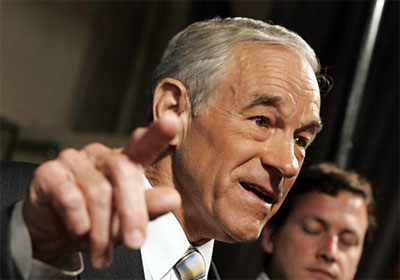Ron Paul could lead a new libertarian/progressive coalition

Amid the current political malaise, many have been speculating that a viable third party will rear its head in 2012. According to Ralph Nader, this “dark horse” might not be a new party at all but a coalition of existing lawmakers. What he foresees is a new dynamic in American politics, one where libertarian-conservatives unite with progressive-liberals on key issues, checking the power of the current corporatist regime that exists in DC.
Appearing on Wednesday's Freedom Watch w/Judge Napolitano, Nader reminded viewers that, “authentic Tea-partiers hail from the conservative-libertarian wing of the Republican party that has been so disrespected and corporatized by the likes of Bush and Cheney.” In truth, Ron Paul is the father of the Tea Party movement. His followers have staged Federal Reserve and anti-bailout protests with an 18th century motif long before their activities were co-opted by Fox News and Palin supporters.
According to Nader, it will be the true progenitors of the Tea Party movement, the Paul-ites, that will forge strong ties with progressives and liberals on common denominator issues such as auditing the Federal Reserve, reducing military spending, and ending corporate welfare. “They're gonna go after all these bloated, corporate welfare subsidies, handouts, giveaways, bailouts,” says Nader.
Lawmakers such as Bernie Sanders and Paul the elder, who put principle before party (apparently there are a few remaining), will alienate a lot of “corporatist Republicans” who've been “getting a unity in the past few years by putting party before principle,” Nader said. "Watch for that nexus that draws that line between libertarian-conservatives and corporatists.”
Nader sees Ron Paul connecting with the “hyper progressive” Sanders to enact greater oversight of America's private, central bank – the Federal Reserve System. Paul's new title as chairman of the House Financial Services Subcommittee on Domestic Monetary Policy and Technology might provide the material support needed for such an endeavor. The libertarian think-tank, the Cato Institute, was also mentioned by Nader as a common intellectual authority for this new libertarian/progressive alliance.
Will operating on principle alone effect real change in such a runaway system?
Nader claims that the new coalition won't have the numbers out of the gate to bring the government grinding to a halt, but will do enough to make a statement and show that they have a voice. The four-time Green party & Independent candidate for president believes the first legislation libertarian-conservatives and progressive-liberals will push through is “a strong whistle blower bill,” like one supported by libertarian-leaning Senator Charles Grassly.





